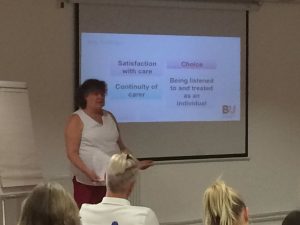 On 26th September the branch of the RCM in Southampton held a study day dedicated to considering human rights concerns in maternity care. It was attended by over 50 practitioners from across the region. Topics covered included a workshop by the human rights in maternity charity, Birthrights, and speakers from Barnados and Stop the Traffik. These latter presenters provided thought provoking, and somewhat harrowing, evidence for the need for awareness of sexual exploitation in young people, and trafficking of humans in our areas of practice. In addition Dr Jenny Hall (pictured right) from CEL and Jillian Ireland, visiting researcher in CMMPH, discussed the human rights of women with disability, based on current research partially funded by Birthrights, undertaken with colleagues Professor Vanora Hundley and Dr Bethan Collins from Liverpool University.
On 26th September the branch of the RCM in Southampton held a study day dedicated to considering human rights concerns in maternity care. It was attended by over 50 practitioners from across the region. Topics covered included a workshop by the human rights in maternity charity, Birthrights, and speakers from Barnados and Stop the Traffik. These latter presenters provided thought provoking, and somewhat harrowing, evidence for the need for awareness of sexual exploitation in young people, and trafficking of humans in our areas of practice. In addition Dr Jenny Hall (pictured right) from CEL and Jillian Ireland, visiting researcher in CMMPH, discussed the human rights of women with disability, based on current research partially funded by Birthrights, undertaken with colleagues Professor Vanora Hundley and Dr Bethan Collins from Liverpool University.
It was an intense event that demonstrated the importance of discussing and researching these aspects of current midwifery care.
Category / Centre for Excellence in Learning
HE policy update for the w/e 22nd September 2017
Fees debate
Last week started with the Sunday Times headline suggesting that the government would reduce tuition fees to £7500 and then the debate that has been continuing all summer boiled over briefly. You can read more about it on Wonkhe here.
Headline grabbing policies on tuition fees are apparently fed by the view that all those students who turned out in much increased numbers (and they did) voted Labour (which many of them did) because of their belief in the Labour policy on fees (since denounced as a lie by the Conservatives). As we wrote in our 7th July policy update when we looked at this question specifically, whether this will work to convert all those student votes is very questionable – students are not single issue voters and even if they were, living costs are probably a more immediate issue for many.
Nick Hillman, Director of HEPI, writes in the Guardian that a Government study providing data on student income and expenditure (due to be published 18 months ago) is still being suppressed by Whitehall. Nick calls for this report to be published to underpin the current furore with a robust evidence-base.
Meanwhile living costs remain a hot topic in an article that talks about Labour “hoovering up the student vote”.
The Labour party conference takes place next week and Conservative party conference starts on 1st October so we can expect more on this over the next few weeks. There are still rumours that there will be an announcement on postponing the inflation based fee cap rise for students starting in 2018/19 (now long overdue and expected to be around £9500), that there will be announcements on reducing interest rates or increasing repayment thresholds for student loans, or just possibly something on maintenance grants.
For BU staff: Consultations, intranet and other resources
Did you know that we track sector consultations and calls for evidence and consultations that are relevant to research areas? We provide links to the documents and BU responses on our BU policy intranet pages? Read about current and previous consultations and find all the links, including to the latest tracker.
If you missed our “TEF: Going for gold” workshop with Professor Debbie Holley of CEL recently, you can read more about the latest plans for the Teaching Excellence framework, including subject level TEF, teaching intensity and learning gain on our TEF pages here You can read about the workshop on the CEL blog.
Our intranet pages cover a range of subjects, including the Higher Education and Research Act 2017 and its implications, the Industrial Strategy and Brexit. See our front page here and our “what’s happening” page here.
Industrial Strategy
The Commons BEIS Committee has published the Government’s response to its Industrial Strategy: First Review report, published in March. The Government confirmed that the Consumer and Competition Green Paper will be published in October and will be “consulting on the case for strengthening scrutiny of future overseas investment in some key parts of the UK’s critical national infrastructure. The Green Paper will set out proposals for discussion and consideration, and will invite stakeholders to provide feedback before any proposals become legislation.”
The recommendations from the report and the responses are set out below in summary:
Recommendations 1 and 2 – “The Government should outline a set of clear, outcomes-focussed metrics..”. And 2: “we recommend that the Government publishes annual updates to its action plan …the Government should also create a single dashboard of metrics …on GOV.UK”.
- Response – “…we are considering the role of metrics in measuring the progress of the Industrial Strategy in meeting its goals. This work is part of ensuring that the Industrial Strategy endures for the long-term.” And (2) “we will be considering the most appropriate mechanisms to update on progress made by the Industrial Strategy and what analysis and data should accompany these updates.”
Recommendation 3 – “We recommend that Government reconsider giving sectoral strategies priority and instead focus on horizontal policies and specific ‘missions’ to meet UK-wide and local public policy challenges.”
- Response – “We agree with the importance placed by the Committee on horizontal policies…However, there is also advantage in addressing the opportunities and challenges in particular industries and sectors—such as by helping create conditions for a thriving supply chain, and developing institutions in which companies can share in research and development and training. …we have proposed to set an ‘open door’ challenge to industry to come to the Government with proposals to transform and upgrade their sector through ‘Sector Deals’. This will allow us to consider and address sector-specific issues which would not otherwise be addressed through horizontal policies.”
Recommendation 4 –“We recommend that specific support for industry be guided by a targeted ‘mission-based’ approach, channelling the Government’s support towards addressing the big challenges of the future. “
- Response –“We agree that one of the strengths of an Industrial Strategy is to be able to bring together concerted effort on areas of opportunity that have previously been in different sectors, or which require joining forces between entrepreneurs, scientists and researchers, industries, and local and national government. The Government has announced a new Industrial Strategy Challenge Fund (ISCF)….” [read more in our Industrial Strategy update in the policy update of 25th August.]
Recommendation 5- “We recommend that the Government consider establishing a joint unit bringing together civil servants from BEIS, the Treasury, the Department for Communities and Local Government, and the Department for Education to provide an inter-departmental team to develop and implement the industrial strategy.”
- Response – “The Industrial Strategy is a Government-wide initiative. …The importance of this is demonstrated by the creation of the Economy and Industrial Strategy Cabinet Committee, chaired by the Prime Minister and comprising the Secretaries of State…….A unit based within the Department for Business, Energy and Industrial Strategy coordinates the development of the strategy….We do not believe that establishing a more formal joint unit will provide sufficient added value to justify the disruption to the policy development that this would cause.”
Recommendation 6 “We recommend that the Government improve the transparency of its engagement with business by publishing details of external meetings in a single, searchable database and extending publication to include all meetings ….”
- Response –“Enhancing transparency and accountability is at the heart of our approach to government –…We have a manifesto commitment to continue to be the most transparent government in the world. …We publish details of Ministers’ and Permanent Secretary meetings with external organisations, including senior media figures, routinely on GOV.UK. Information about meetings between officials, businesses and charities are not currently held centrally and could only be obtained at disproportionate cost. Expanding this approach to include all Senior Civil Servants would be a lengthy and costly process …”.
Recommendation 7 – “We recommend that the Government work with industry and local government to conduct a holistic review of the business services and support it offers with a view to simplifying access to advice on these in order to improve the ‘customer journey’. “
- Response – “Government plays an important role in signposting businesses to the support and advice that they need to improve, grow and scale-up their business. Through GOV.UK, supported by a Business Support Helpline and Local Enterprise Partnership (LEP) led Growth Hubs, businesses are able to receive free, impartial support, which aims to simplify their journey to finding the right advice at the right time. In the Industrial Strategy Green Paper we …highlighted that we would look to identify any potential gaps in current policy, informed by international best practice. We also announced a Scale-Up Taskforce, overseen by the Minister for Small Business, to support high growth scale-up businesses across the UK….”
Recommendation 8 – “We repeat our previous recommendation that the Government should set a target to increase R&D investment to 3 per cent of GDP and implement policies to achieve it.”
- Response – “This Government has set out its vision to meet R&D investment of 2.4% of GDP within ten years and 3% in the longer-term. Going forward, this ambition will be an important part of our Industrial Strategy and will require a concerted cross-government approach.”
Recommendation 9 – “In line with the Secretary of State’s stated aim to support disruptors and economic innovation, we recommend that the Government review with industry whether additional steps are needed to provide regulatory certainty for emerging business models.”
- Response – “The Green Paper recognised that new entrants, not just incumbents, play an important role within established sectors of the economy, and that innovative businesses are driving growth in important new sectors. …The Government recognises that, to do this, we must understand key technology trends, foster growth in the new sectors (such as AI and Robotics) that will become increasingly economically significant, and work with established sectors (such as Education and Insurance) as new entrants deploying new technologies and business models emerge and change sector dynamics. In line with the Green Paper commitment the Challenger Business Programme that engages new entrants in existing sectors is being expanded into a Future Sectors team. …”
Recommendation 10 – “We recommend that the Government consider the potential for greater devolution of responsibility and funding for skills to local authorities and Local Enterprise Partnerships….”
- Response – “We recognise we need to bring forward a new offer on skills and technical education …which is why we’ve set out our ambitions for wide-ranging reforms to technical education in both the Industrial Strategy Green Paper and, more recently, in the Budget set out by the Chancellor in March….Alongside this we are devolving the adult education budget to the mayoral combined authorities, starting with a transition towards devolution in 2018/19. Full transfer of statutory adult education functions to the combined authorities, and delegation to the Mayor of London, will take place in 2019/20, subject to readiness conditions. …We are continuing to work towards devolution deals with England’s largest cities where they don’t have them at present. We will also be setting up Skills Advisory Panels in England that will bring together local employers, providers and LEPs to identify local skills needs and inform delivery to support local growth.”
Recommendation 11 – “we recommend that the Government exclude university students from immigration totals and promote high skilled migration to the UK on an equal “who contributes most” basis to people wishing to invest and innovate in the UK.”
- Response – “The Government strongly welcomes genuine international students who come to the United Kingdom to study. There is no limit on the number of genuine international students who can come to study in the UK and there is no intention to impose a limit on the number of international students that any institution can recruit.”
- “Migration statistics are produced by the Office for National Statistics (ONS), the UK’s independent statistical authority. It is for the ONS to determine how statistics are compiled. By including international students in its net migration calculations, the ONS is using the internationally accepted definition of migration, which includes all of those who move for more than 12 months, including students. Other major countries such Australia, Canada and the United States include students in their migration statistics.
- “Those planning the provision of services need to know who is in this country and, like other migrants, international students have an impact on communities, infrastructure and services while they are here. So long as students are complying with the terms of their visas and returning home at the completion of their studies, the overall contribution of students to net migration should be very small and incremental growth in student numbers, along the lines of that seen in recent years, can be accommodated within the net migration target. The target does not require us to impose restrictions on student numbers and we have no intention of doing so.
- “We recognise the value of international students and this is why we are commissioning the independent Migration Advisory Committee (MAC) to provide an objective assessment of the impact of international students.
- “We are considering the options for our future immigration system very carefully. As part of that, it is important that we understand the impacts of different options on different sectors of the economy and the labour market. We will build a comprehensive picture of the needs and interests of all parts of the UK and look to develop a system which works for all. As part of our evidence gathering, we have commissioned the Migration Advisory Committee to consider patterns of EU migration and the role of migration in the wider economy, including how we align our immigration system with the Industrial Strategy. Parliament will have an important role to play in this, and we will ensure that businesses and communities have the opportunity to contribute their views.”
Recommendation 12 – “Fiscal levers can play a key role in shaping business behaviour. We recommend that Government commission an independent review bringing together broad representation to consider whether taxation levers can better be used to boost investment in physical and human capital, research and innovation.”
- Response –“ The government recognises the role of fiscal levers in shaping business behaviour and is committed to ensuring that Britain has a competitive tax system that encourages businesses to invest. …The government keeps all tax policy under review but we do not see the case for an independent review at this time.”
Recommendation 13 – “We recommend that the Government conduct a fundamental review of the outdated structure of the business rates system….”
- Response – “The government conducted a review of business rates in 2015. This review concluded at Budget 2016 where the government announced business rates reductions, costing nearly £9bn over the next five years, benefitting all ratepayers. …All ratepayers will benefit from the switch in indexation from RPI to the main measure of inflation (currently CPI) from April 2020. ….In addition, the government has cut the main rate of corporation tax from 28% to 19% from April 2017 and it will fall further to 17% in 2020.”
Recommendation 14 – “The Government should also consider the opportunities to further boost procurement from within the UK as part of its negotiating strategy for withdrawal from the EU.”
- Response – “We welcome the Committee’s endorsement of our work to maximise opportunities for UK firms to compete in public procurement. The issue of how procurements should be governed following our exit from the EU is being considered as part of the wider [Brexit] process …”
Recommendations 15 and 15 – “…the Government needs to provide much greater clarity and certainty as to what steps it intends to take to intervene in foreign takeover deals and in what circumstances.” And (16) “We recommend that the Government takes steps to ensure it has the power to retain IP benefits in the UK in the event of a foreign takeover”
- Response [Subject to change if published after the Consumer and Competition Green Paper in October]
- “…Maintaining a clear, stable and open environment for trade and investment is, and will continue to be, core to our approach. …We will therefore be consulting on the case for strengthening scrutiny of future overseas investment in some key parts of the UK’s critical national infrastructure in order to protect against potential national security risks. The Green Paper will set out proposals for discussion and consideration, and will invite stakeholders to provide feedback before any proposals become legislation.”
- And (16): “…When companies in receipt of public funds are taken over, Government is able to safeguard public funds by using ‘change of control’ clauses in funding agreements where they exist.”
Recommendation 17 – “The Government needs to provide clarity on the respective roles and responsibilities between national, local and regional institutions. ….While many services may best be designed at a local level, the Government needs to ensure that it avoids creating barriers to cooperation between local institutions or inadvertently introducing perverse incentives that lead to needless and inefficient duplication of services.”
- Response – “We are conducting a review into strengthening the role of LEPs. This gives us the opportunity to consider how we can support the business voice by bringing it further into local economic decision making…”
Recommendation 18 – “We recommend that the Government set out a clear plan to close per head spending gap on infrastructure, R&D and education between London and the rest of England.”
- Response – “The Government recognises the importance of spending on infrastructure, R&D and education to support growth across all regions of the UK. …The White Paper will be an important vehicle to consider these issues in more depth…The Green Paper recognised that, although we have world-leading centres of excellence and leading R&D clusters, we need to do more to strengthen areas outside the ‘golden triangle’ of institutions and businesses between Oxford, Cambridge and London. ….We are now considering how different policy approaches might work in the wider funding landscape for regions and places”.
Alternative and niche providers
Higher Education Commission launched its report: ‘One size won’t fit all: the challenges facing the Office for Students’ The report makes recommendations for the OfS, following hot on the heels of those made by the Minister last week – it looks at alternative and niche provision. There’s a Wonkhe article here
Strategic challenges for the OfS:
- The unintended consequences of policy reform and funding continue to favour the offer of certain modes of study and undermines choice for students
- The balance between upholding quality and encouraging innovation is not achieved, either damaging the sector’s reputation or meaning the sector does not keep pace with changes in technology and the labour market
- Innovation and growth in the sector does not effectively align with the industrial strategy or aspirations for regional growth
- Price variation and two tier provision result in greater segregation across the system damaging social mobility
- The student experience of higher education is undermined as some providers struggle with competition and funding challenges
- Institutional decline, and ultimately failure, reduces choice and the quality of provision in certain areas, or damages the student experience or the perceived value of their qualification
- The Office for Students in its new role as the champion of ‘choice for students’ and ‘value for the tax payer’ must address these challenges. It is hoped that the findings in this report and the recommendations outlined below will aid the new regulator in ensuring the continued success of the sector.
The report includes an interesting overview of how we got to where we are now, and then moves on to look at some knotty issues facing the sector, including alternative models, and a number of themes that arise in that context (such as access, support for students and progression). They look at class and course size, which is interesting given the new TEF focus on “teaching intensity”, practitioner lecturers, industry experience, sandwich degrees and apprenticeships. There is a chapter on funding, costs and fees and of course the report looks at part-time and accelerated courses, also another hot topic for universities as well as alternative providers. The report also examines some of the perceived barriers to innovation which were cited in government papers – validation (which is described a barrier to innovation rather than entry) and retention being a problematic measure for alternative providers.
The consequences of all this start in chapter 4 (page 55) where the report turns to recommendations for the OfS as the regulator.
The recommendations are:
- Universities should learn lessons from the further education sector to create an environment that feels more accessible to students from low participation backgrounds.
- The OfS should work with HEIs and alternative providers to identify how personalised and industry-orientated provision can be scaled up and replicated across the system.
- The OfS, as a principal funder and regulator of the HE sector, should develop ways of incentivising industry practitioner involvement in universities.
- Universities should consider flexible models of placements for sandwich degrees in order to meet the needs of SMEs.
- The OfS should closely monitor the impact of degree apprenticeships on sandwich courses and other work based learning provision.
- The OfS should address cost issues around part-time study and accelerated degree programmes, so as to support wider provision of these non-standard modes.
- We recommend that the OfS monitors the implications of different delivery costs between HE and FE, not least in terms of enabling entry to part-time and mature students.
- Research should be commissioned by the OfS to better understand how students, especially from disadvantaged backgrounds, can be encouraged to use sources of information more critically in their HE choices.
- The Office for Students should provide Parliament with an annual report mapping the diversity of provision across the higher education sector, commenting on trends and explanations for changing patterns of provision.
- The DfE and the EFSA should consider the viability of allowing employers to use the apprenticeship levy to fund work-relevant part-time HE
- The DfE should consider the extent to which accelerated and flexible programmes could be supported by changes to the funding based on credit.
Brexit
Question to the Treasury
Q: Stephen Gethins – If he will make an assessment of whether there will be any gap in funding for UK universities during the transition from EU structural and investment funds to the UK Shared Prosperity Fund.
A: Elizabeth Truss – The Government made a manifesto commitment to use the EU structural and investment fund money returning to the UK after the UK leaves the EU to create a UK Shared Prosperity Fund. In October 2016 the Chancellor confirmed that HMT would guarantee funding for all multi-year ESIF projects signed ahead of the point at which the UK leaves the EU. Funding will be honoured provided that the relevant government department considers the project to provide good value for money and be in line with domestic strategic priorities.
Question on Exiting the European Union
Q: Baroness Coussins – When issues relating to the UK’s participation in the Erasmus Programme will be scheduled for discussion as part of the negotiations on exiting the EU.
A: Baroness Anelay Of St Johns – At the start of these negotiations, both sides agreed that the aim was to make progress on four key areas: citizen’s rights, the financial settlement, Northern Ireland and Ireland and broader separation issues. Both sides need to move swiftly on to discussing our future partnership, including specific European programmes we may still wish to participate in. We want that to happen after the October European Council. The UK government does recognise the value of international exchange and collaboration in education and training, and this forms part of our vision for the UK as a global nation.
Other business this week
The Education Policy Institute published Entries to arts subjects at Key Stage 4 noting a sharp decline in the numbers of pupils studying art and design; drama and theatre; media, film, and TV studies; music; dance; and performing arts. In 2016 entry rates to arts subjects at key stage 4 were the lowest in 10 years. There is evidence of a North-South divide with Southern regions more likely to choose arts options. The report also notes substantial gaps in the arts entry rates from pupils with different ethnic backgrounds. Black Caribbean pupils have particularly high entry rates, whilst pupils from Indian and Pakistani backgrounds are much less likely to take an arts option than those from other ethnic groups. The decline in entry to arts subjects will likely have a knock on effect for university applications within the subject areas by 2020. Entry rates peaked in 2014 so the 2018/19 academic year may see a higher volume of applications. The publication discusses the influence of the introduction of the English Baccalaureate (EBacc) and of Progress 8 which may be deterring entry to arts subjects as they are not within the core subjects for the EBacc.
HEPI published The Positive and Mindful University. The report advocates creating a proactive culture where by students and staff develop their capacity to deal with adversity to prevent mental health problems manifesting. The report provides short school-based cased studies and examples from an Australian and Mexican University. Chapter 4 discusses the UK based good practice and UUK’s mental health in HE programme. Chapter 5 (page 41) sets out 10 steps to support students to make a positive transition to university.
JANE FORSTER | SARAH CARTER
Policy Advisor Policy & Public Affairs Officer
65111 65070
Follow: @PolicyBU on Twitter | policy@bournemouth.ac.uk
REF & TEF: the connections – 11th October 2017

The outcomes of this year’s Teaching Excellence Framework (TEF) and the direction for the Research Excellence Framework (REF) as set out in the 2017 consultation response are likely to have significant implications for the higher education sector. The links between research and teaching are likely to become ever more important, but set against the context of increasing emphasis on student experience, how should the sector respond and where should it focus?

REF & TEF: the connections will be hosted at Bournemouth University and will bring together some of the leading experts in higher education in both research and teaching policy. During the morning, attendees will have the opportunity hear from experts from across the higher education sector, as they share their insights into the importance of the links between teaching and research. The afternoon will feature a number of case studies with speakers from universities with a particularly good record of linking research and teaching.
Speakers confirmed to date include Kim Hackett, REF Manager and Head of Research Assessment, HEFCE and John Vinney Bournemouth University, William Locke University College London, Professor Sally Brown Higher Education Academy.
For more information or to book on visit: https://reftef.eventbrite.co.uk

What happens when things go wrong in medicine?
1-day BU conference/workshop examining what happens when things go wrong in surgery, 8th September 2017
Every day we make mistakes; we pick up the wrong set of keys from the kitchen drawer, pick up the wrong identical suitcase from the airport carousel, or, in the case of the Oscars, a near identical envelope is given to Warren Beatty who then announces the wrong Best Film winner.
What happens when things go wrong in surgery where the consequences can be much more serious? While attention, quite rightly, focuses on patient need when things go wrong, the aim of this event is to examine how medical professionals can be better supported and trained to cope with these adverse events.
Eminent speakers from around the UK will present the latest research in the area, share insights from their surgical careers and personal experiences and will consider:-
Impact – The personal impact when complications and errors arise in surgery
Resilience – Dealing with stress and maintaining wellbeing
Restoration – what can be done when things go wrong?
While the focus is on surgeons, it is clear that those in other medical professions (e.g. nurses, midwives, GPs) face similar issues in the workplace. Anyone with an interest in the topic is welcome to attend (attendance is free for BU staff). For further details and to register for the conference please visit www.surgeonwellbeing.co.uk or contact Professor Siné McDougall (smcdougall@bournemouth.ac.uk; ext. 61722).
Fair Access Research project (FAR) webpages are launched
The FAR project webpages have now been published.
BU’s pioneering Fair Access Research project has brought together students, SUBU, professional, service and academic staff from across the university to develop and expand expertise and reflexive practice in the field of fair access to higher education.
Each member of the team has brought different knowledge and experiences to a series of innovative research projects exploring what it means to be a ‘non-traditional’ student in the 21st century. FAR has inspired new ways of thinking about fair access and widening participation through this ‘whole institution approach’,
The team has explored all the different stages in the student lifecycle developing an understanding of the challenges some students face in accessing or succeeding at university, how university is experienced by diverse groups of students and how the university can support them in the optimum way when they are here.
Explore the five themes of the FAR programme on the webpages at https://research.bournemouth.ac.uk/project/fair-access-research-and-practice-far/
Outreach

Contact principal investigators Dr Vanessa Heaslip or Dr Clive Hunt for further information
Good month for BU reproductive health publications
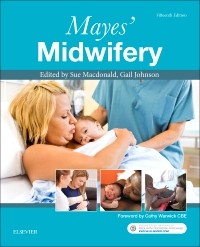 This month has been exceptionally good for BU publications in the field of midwifery and maternity care. Two PhD students has their articles published in international academic journals, one member of staff had a textbook chapter published, an interdisciplinary team has been accepted for publication in the British Journal of Midwifery, and a member of the Centre for Midwifery, Maternal & Perinatal Health (CMMPH) co-authored this month’s editorial in the Journal of Asian Midwives as well as an epidemiology paper on the HPV (Human Papilloma Virus) in Nepal.
This month has been exceptionally good for BU publications in the field of midwifery and maternity care. Two PhD students has their articles published in international academic journals, one member of staff had a textbook chapter published, an interdisciplinary team has been accepted for publication in the British Journal of Midwifery, and a member of the Centre for Midwifery, Maternal & Perinatal Health (CMMPH) co-authored this month’s editorial in the Journal of Asian Midwives as well as an epidemiology paper on the HPV (Human Papilloma Virus) in Nepal. 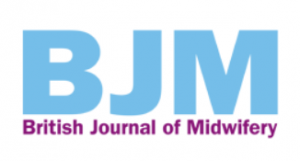
The first of this success story was CMMP PhD student Preeti Mahato whose her latest paper ‘Factors related to choice of place of birth in a district in Nepal’ appeared in the Elsevier journal Sexual & Reproductive Healthcare [1]. The second PhD paper was also based on research in Nepal this time by Sheetal Sharma whose paper ‘Evaluation a Community Maternal Health Programme: Lessons Learnt’ appeared in Journal of Asian Midwives [2]. The textbook chapter was by Dr. Jenny Hall who contributed a chapter to the latest edition of Mayes Midwifery , which is the classic midwifery textbook and now in its 15th edition [3]. The interdisciplinary paper is by Angela Warren, service user and carer coordinator PIER partnership, Dr Mel Hughes, principal academic in social work, academic lead for PIER partnership, and Dr Jane Fry and Dr Luisa Cescutti-Butler who are both senior lecturers in midwifery in the Centre for Midwifery, Maternal & Perinatal Health (CMMPH) [4]. The latest issue of the Nepal Journal of Epidemiology carried a CMMPH co-authored paper on the HPV in young women in Nepal [5]. The final piece, an editorial, appeared yesterday in the latest issue of the Journal of Asian Midwives [6].
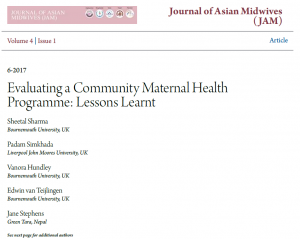
Congratulations to all authors!
Prof. Edwin van Teijlingen
CMMPH
References:
- Mahato, P., van Teijlingen, E., Simkhada, P., Sheppard, Z., Silwal, R.C. (2017) Factors related to choice of place of birth in a district in Nepal, Sexual & Reproductive Healthcare 13 : 91-96.
- Sharma, S., Simkhada, P., Hundley, V., van Teijlingen, E., Stephens, J., Silwal, R.C., Angell, C. (2017) Evaluation a Community Maternal Health Programme: Lessons Learnt. Journal of Asian Midwives. 4 (1): 3–20.
- Hall, J. (2017) ‘Fertility and it’s control’ In: Macdonald, S. & Johnson, G. Mayes’ Midwifery, 15th Edition, London: Elsevier.
- Warren, A., Hughes, M., Fry, J., Cescutti-Butler, L. (2017) ‘Involvement in midwifery education: experiences from a university service user and carer partnership’ British Journal of Midwifery (forthcoming).
- Sathian, B., Babu, MGR., van Teijlingen, E.R., Banerjee, I., Subramanya, H.S., Roy, B., Subramanya, H., Rajesh, E., Devkota, S. (2017) Ethnic variation in perception of Human Papillomavirus and its Vaccination among young women in Nepal, Nepal Journal of Epidemiology 7 (1): 647-658. http://www.nepjol.info/index.php/NJE/article/view/17757
- Jan, R., van Teijlingen, E. (2017) Exciting Times in South-Asian Midwifery, Journal of Asian Midwives 4 (1):1
The challenges and rewards of teaching qualitative analysis with software
Qualitative research is gaining momentum in social sciences, education and health, with new developments appearing every year for gathering, analysing and disseminating data. This session will focus on the teaching and learning potential of specialised programmes for the process of systematising and analysing qualitative data.
The session will cover the basic features of computer assisted qualitative data analysis software (CAQDAS) and their possible role in students’ understanding of qualitative analysis. Specifically, it will be suggested that the process of data analysis and related techniques (content, thematic, framework and discourse analysis, to name a few) should beadvanced before students engagement with CAQDAS, but that CAQDAS have the potential to enhance students’understanding of qualitative data analysis in practice. The session will outline some practice-based recommendations for engaging students when running interactive qualitative data analysis sessions in general andworkshops for CAQDAS in particular.
Aims and objectives:
- To introduce attendees to the basic and advance features of CAQDAS
- To discuss the challenges and rewards of teaching qualitative analysis using CAQDAS
- To stimulate discussion around qualitative methods teaching
Save the date: Monday 24 April, 12.00-13.30. Talbot Campus.
Bookings should be made through the Intranet, with Organisational Development.
The session will be facilidated by Dr Jacqueline Priego, who has been delivering CAQDAS workshops and training postgraduate students and researchers on qualitative analysis since 2010. She is also available for queries relating to MAXQDA and QDAMiner (not supported at BU).
NVivo workshop and surgery – 23 March
As part of the Graduate School’s Research Development Programme 2016/17, Jacqueline Priego from CEL will be delivering an NVivo workshop. Details below:
Date: 23 March 2017
Time: 14.00 – 17.00
Venue: S103
Bookings via myBU *
Audience: This workshop is suitable for PGRs with some knowledge of qualitative analysis approaches.
Intended learning outcomes. By the end of this workshop you should be able to:
• Confidently identify the main elements of the NVivo interface
• Open and create new NVivo projects
• Prepare and modify documents
• Create codes and code documents
• Rearrange the coding system
• Perform simple retrieval of coded documents
• Use annotation and linking tools.
If you are already using NVivo for your research, you might like to drop in for the last half an hour of the session, when an open surgery will be held.
Jacqueline Priego has been delivering CAQDAS workshops and training postgraduate students and researchers on qualitative analysis since 2010. She is also available for queries relating to MAXQDA and QDAMiner (not supported at BU).
*Spaces are limited due to room capacity – please book through myBU to avoid disappointment.
CPD study findings presented in Kathmandu
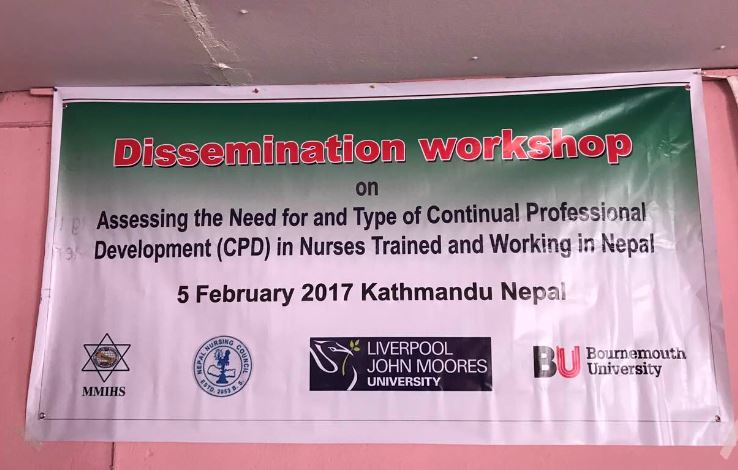 Today we offered preliminary feedback to key stakeholders in Kathmandu as part of our research into CPD (Continuous Professional Development) for nurses in Nepal. Today’s presentation is party funded by LJMU (Liverpool John Moores University) and partly funded by BU’s Centre for Excellence in Learning (CEL). Late 2016 CEL funded the qualitative part of our research project. In this CPD project we work with representatives of the Ministry of Health , the Ministry of Education, the Nepal Nursing Association and the Nursing Council, and providers of Nursing Education (both Government-run universities and private colleges).
Today we offered preliminary feedback to key stakeholders in Kathmandu as part of our research into CPD (Continuous Professional Development) for nurses in Nepal. Today’s presentation is party funded by LJMU (Liverpool John Moores University) and partly funded by BU’s Centre for Excellence in Learning (CEL). Late 2016 CEL funded the qualitative part of our research project. In this CPD project we work with representatives of the Ministry of Health , the Ministry of Education, the Nepal Nursing Association and the Nursing Council, and providers of Nursing Education (both Government-run universities and private colleges).
 Today key presenter was BU Visiting Faculty Dr. Bibha Simkhada (based at LJMU). The event was opened by Associate Professor Chandra Kala Sharma, who is also the president of the Nepal Nursing Association (lighting the traditional lamp in photo right).
Today key presenter was BU Visiting Faculty Dr. Bibha Simkhada (based at LJMU). The event was opened by Associate Professor Chandra Kala Sharma, who is also the president of the Nepal Nursing Association (lighting the traditional lamp in photo right).
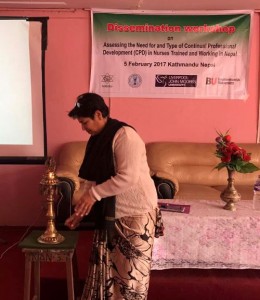
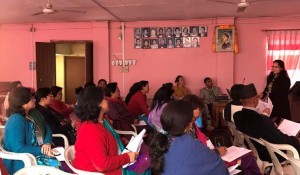 Our BU contributors, Dr. Catherine Angell and Prof. Edwin van Teijlingen, are both based in the Centre for Midwifery and Maternal & Perinatal Health (CMMPH). We are grateful to our collaborators in Nepal, especially Dr. Sujan Marahatta at Manmohan Memorial Institute of Health Sciences, for organising this event in our absence. The CPD research project is truly a FUSION project in the field of nursing & midwifery since it links Research in the field of Education to help improve Practice in Nepal. Further information can be found on a previous blog post, click here!
Our BU contributors, Dr. Catherine Angell and Prof. Edwin van Teijlingen, are both based in the Centre for Midwifery and Maternal & Perinatal Health (CMMPH). We are grateful to our collaborators in Nepal, especially Dr. Sujan Marahatta at Manmohan Memorial Institute of Health Sciences, for organising this event in our absence. The CPD research project is truly a FUSION project in the field of nursing & midwifery since it links Research in the field of Education to help improve Practice in Nepal. Further information can be found on a previous blog post, click here!

Prof. Edwin van Teijlingen
CMMPH
Call for project proposals – T/REFF funding


We are happy to announce this first TREFF call for proposals
TREFF (German word) – meeting point / coming together (thanks to Stephen Jukes!)
Two projects will be funded (£750 maximum each). One TREFF project will be funded in FMC by CEMP and one from UoA25 for non-FMC staff.
With the forthcoming Teaching Excellence Framework and the new version of REF, after the STERN report, ahead of us, we are keen to explore ways of working that converge pedagogic innovation with educational research in BU’s subject areas. Our view is that separating TEF and REF is problematic and that the STERN report and TEF together provide rich opportunities for higher education practitioners to align teaching excellence with impactful research.
Towards this, we are offering 2 small grants of £750 to fund T/REF pilot projects (TREFF).
The funding must be spent by the end of July 2017 and be supported by line manager(s), with the following outcomes:
An action research intervention that aims to make a significant difference to learning and teaching, related directly to the criteria for TEF;
The submission of a journal article reporting on the findings of the project and their significance for educational research (or a related field) outside of BU;
A presentation to faculty staff / CEL on how the project converged TEF and REF criteria (for unit of assessment 25 – Education)
More info on TEF: https://www.timeshighereducation.com/news/teaching-excellence-framework-tef-everything-you-need-to-know
FMC proposals should be submitted to both Isabella Rega and Julian McDougall
Non-FMC proposals should be submitted to both Debbie Holley and Julian McDougall
Proposals should be submitted by email, consisting of 2 elements:
A succinct proposal for the action research project, including the proposed outcomes (no more than 2 sides of A4)
A detailed expenditure plan for the funding – maximum £750.
Line manager support must also be confirmed at the point of application.
Deadline for proposals – Feb 28th 2017
Projects to be completed / funding spent by 31.7.17
________________
HE policy update w/e 3rd February 2017
Higher Education and Research Bill – the House of Lords committee stage has finished with no further amendments (other than non-controversial and welcome government amendments). Unlike in the House of Commons, where time was more limited and there was a great deal of focus on the Teaching Excellence Framework (TEF), student loans, the impact of Brexit and limits on international students rather than the detailed content of the Bill, in the House of Lords there has been much more detailed analysis of the Bill and very lively debate about issues such as institutional autonomy, the role and governance of the research councils and the role of the Office for Students. The other issues were also discussed, but none of the many amendments proposed by a long list of peers were approved. Assurances have been given by the government that the points made in the debates will be considered and so it is likely that further government amendments will be proposed at the report stage, which is likely to be in late February or early March. The Bill will then have to go back to the House of Commons, as it has been amended. Research Professional have a helpful summary of the position.
In related news, Mark Walport has been appointed as CEO of UKRI and has written for Times Higher Education. He notes: “We cannot sit on our laurels, or even our Nobel prizes. Research and innovation funding is still largely delivered by organisations siloed in traditional disciplines, allowing some imaginative proposals to fall between the cracks. Solving many of the most important fundamental research questions and tackling the challenges facing society requires an interdisciplinary approach.”
Brexit – the EU (Notification of Withdrawal) bill – the (very short) Bill was passed on its second reading this week. The committee stage is next – unlike the HERB (dealt with in the Public Bill Committee), this will be a committee of the whole House of Commons, which is scheduled for 6-8 February. The current 142-page list of proposed amendments is quite interesting and will probably grow. The Bill will then go to the Lords, where there may be further attempts to amend it.
After refusing to agree that the government would issue a white paper on Brexit, one was rushed out on 2nd February after the Bill was passed. BBC Newsnight reported that it was issued at 4 am and has typos in it, but at 77 pages, it attempts to cover a lot of ground. There has been grumbling from the sector about the things that it doesn’t cover (e.g. Erasmus), and although there is no new news in it for us, there is some reassurance too. It refers to commitments already made on guaranteeing EU research funding. In the migration section it refers to students as its third point – so very high up the agenda – in fact it is the ONLY group referred to specifically. The paper says that “the Government recognises the important contribution made by students and academics from EU Member States to the UK’s world class universities. A global UK must also be a country that looks to the future”. No assurances about what that means, but it is helpful, especially as it doesn’t say anything like that about any other sector. In Science and Innovation, it says nice things about universities and refers to the Industrial Strategy. It includes lots of reassurances about continuing to apply for funding. It also says “we would welcome agreement [from the EU] to continue to collaborate with our European partners on major science, research and technology initaitives”. The White Paper will no doubt be discussed alongside the Bill in the Committee Stage, and we will see what comes next.
Bell Review – The UUK review of sector agencies, chaired by Sir David Bell, has published recommendations. In order to reduce costs to the sector and ensure focus and a strategic approach, the report recommends streamlining the current list of sector agencies from 9 to 7 by merging the Equality Challenge Unit, the Higher Education Academy and the Leadership foundation for Higher Education. In addition, the Higher Education Careers Services Unit (HECSU) will become self-financing through its commercial activity and will no longer take subscriptions from providers. To ensure efficiency and a more strategic focus on data, the report recommends that HECSU, the Higher Education Statistics Agency (HESA), Jisc and UCAS should form a strategic delivery partnership with a focus on improving the efficiency and effectiveness of data-related functions and services –writing on Wonkhe Sir David confirms that this group has already been formed. Link to the main report here.
UCAS applications data – this has been released today and is widely covered in the academic press.Wonkhe have a nice summary and they pull out some key charts
- 30,000 fewer applications across the sector than a year ago (5% down)
- First decline in overall applications since 2012 and nearly wipes out increases since 2013
- Not spread evenly across the sector
- Drop in EU applications – a shame as some had predicted a surge of applications this year while home fees and student loans are still in place, and may be a sign of a permanent decline, (see the last HEPI report on this question)
Factors that are cited include:
- Brexit uncertainty for EU applications –-around 6000 applications down
- Nursing – driven by financing changes – 5000 down. Also influenced by drop in mature applicants
- Mature student applications are down across the board – believed to be a result of more jobs and higher wages (so people not retraining), as well as nursing funding – 12000 applicants down
- Demographic dip in 18 year olds and a decline in students taking BTECs is apparently behind a 7000 drop in 18 year old applications.
The numbers are a bit of a guess as these categories overlap.
On Wonkhe, Fleur Nielsen from the Council of Deans of Health says it’s not time to panic (yet). She comments on the difference between applications and admissions, and also notes that there is still a challenge of increasing numbers (as required by the government) when there are limits on placements (which is appoint that BU has consistently made in consultations on this topic). “The scale of the fall in application numbers is not the critical factor for universities or the health and social care sector. Courses that were previously heavily oversubscribed can survive a significant dip in application numbers as long as the quality of applicants is good, and our members report that this remains so.”
HESA has published its Open Data Strategy 2017-2021 – following the consultation last year. Importantly, the strategy says that HESA will migrate its current range of data publications to open data, free of charge to users, over the next 5 years, publish more data openly and establish a user group.
Inclusive teaching and learning in HE – the Department for Education have published a report by the Disabled Student Sector Leadership Group. This is an independent group made up of representatives of a number of relevant sector bodies and 6 UK universities. The report encourages higher education providers (HEPs) to look at how they can support and offer the best environment for disabled students.
- It considers the requirement to provide ‘reasonable adjustments’ under the Equality Act 2010, and suggests actions to mitigate risks associated with that, including how providers can adopt a strategic approach to reasonable adjustments.
- It sets out the benefits of inclusive practice to higher education providers
- It provides examples of simple actions to affect change
Widening Participation: HESA has released statistics on widening participation from the 2015/16 academic year. It shows that progress is slowing although there are range of different angles on the data (thanks to Wonkhe for these links):
- Oxford University bucks national trend and accepts fewer state school students, figures show – The Telegraph
- Cambridge intake no longer most privately educated – BBC
- One in ten new undergraduates from poor background as inequality gap gets wider – The Times
Technology-Enhanced Learning: The Higher Education Policy Institute (HEPI) have published a report on the impact of technology on universities (Rebooting learning for the digital age: What next for technology-enhanced higher education?). The report reviews best practice around the world to show how technology is benefiting universities and students through better teaching and learning, improved retention rates and lower costs:
- in the US, curriculum redesign using technology-enhanced learning produced better student outcomes in 72 per cent of projects and average savings of 31 per cent;
- the University of New England in Australia reduced student drop-out rates from 18 per cent to 12 per cent via learning analytics; and
- at Nottingham Trent University, 81 per cent of first-year students increased their study time after seeing their own engagement data.
You can read about BU’s Technology Enhanced Learning Toolkit on the CEL website.
Submissions for the Research Photography Competition are closing soon!

There’s not long left to submit your entry to the Research Photography Competition. Submissions will be closing on Friday 27 January at 5pm.
We have already seen a number of fantastic images submitted from both our staff and student researchers, but there’s still time to submit your image. This a great opportunity to present your research that you’re either currently working on or have already completed. The competition allows your research to be showcased across BU and is a great addition to your portfolio.
You can find out more information here.
If you have any questions then email us.
Please read through the terms and conditions here.
Introduction to Education Practice: A Programme for Research Students
The next session of our ‘Introduction to Education Practice‘ course will run from the 27th to the 29th of March.
This is a research-driven, practice-based course, aimed at doctoral students who are or will be supporting teaching activities.
The course has four main aims:
- To introduce students to theoretical and practical knowledge on adult learning, with special emphasis on the UK context.
- To introduce students to the UKPSF and the dimensions of Areas of Activity, Core Knowledge and Professional Values that underpin teaching and supporting learning.
- To familiarise students with BU’s services and schemes for teaching and learning, as well as with leaning technology tools.
- To provide students with opportunities to discuss and reflect about their particular teaching goals, and to offer a collegial space where they can receive feedback on their teaching practice.
 Topics covered in the course include:
Topics covered in the course include:
• The student experience of learning.
• Planning student-centred learning.
• Working in large and small groups.
• Assessment for learning.
• The potential of learning technology.
On the last day we celebrate our students’ learning by engaging them in a micro-teaching task, where they receive feedback and recommendations to improve their teaching practice.
The course is supported through materials in myBU.
Taking the course as a stepping stone, an optional follow up session will be organised for those students who would like to apply for Associate Fellowship of the Higher Education Academy through the internal scheme TeachBU – a great way of enhancing the doctoral studies experience in preparation for academic posts.
To see images and resources shared by previous cohorts, check out out #TeachBU on Twitter.
Course Convenor: Dr Jacqueline Priego (CEL).
To enroll please contact Organisational Development od@bournemouth.ac.uk (register earlier to avoid disappointment, as spaces are limited).
Featured image credit: Tess Watson (CC BY 2.0).
From Draft to REF with CEMP’s new Publishing Partnership Initiative
Do you have an incomplete paper that you’ve been sitting and can’t seem to finish? Have you recently presented at a conference, but haven’t written-up a paper out of your presentation yet? Did you get a rejection and are struggling to get motivated again? Or maybe you’ve written a couple chapters of your PhD and are hoping to turn one into a publication?
Whatever the scenario, CEMP’s new Publishing Partnership Initiative (PPI) can help you to collaborate with another researcher to turn your ideas into a viable REF-ready journal article. And did we mention, you can win a free dinner for two?
Publishing Partnership Workshop
Thursday January 26th
Talbot Campus, BU
11:00-14:00
WG 05 (Weymouth House)
To launch the initiative, this workshop will introduce the Publishing Partnership Initiative and help you find a good match to develop your REF output. We will also discuss strategies and tips for working toward REF submissions:
11:00-11:15 Introductions and coffee
11:15-11:30 Welcome to the PPI scheme (Anna and Richard)
11:30-12:00 Hear No Evil, See No Evil: What you need to know about REF and the Sterne review (Julian & Dan J)
12:00-12:45 Interactive session: Strategies for fitting writing into our busy schedules (Brad & Karen)
12:45-13:15 Academic Match.com: Finding the right journal and writing partner for your research output (Anna and Isa)
13:15-14:00 Catered planning lunch with our publishing partners
To participate: Send a 500+ word rough draft or outline of a potential research paper to afeigenbaum@bournemouth.ac.uk AND Richard rberger@bournemouth.ac.uk by Monday 23rd January 2017. This might be an abandoned draft, a conference version of a paper presentation or an outline for a possible research paper. At this stage, any draft you have might be gold, so don’t be shy!
To be a mentor or writing partner: Send an email with a list of your research and methodological areas of expertise to afeigenbaum@bournemouth.ac.uk AND Richard rberger@bournemouth.ac.uk by Monday 23rd January 2017.
Eat your Success! Partners who successfully submit a paper to a peer review journal within the 5 month time frame will receive a ‘dinner for two’ voucher to celebrate their success.*
*Voucher is worth up to £45.00. Does not cover alcoholic beverages.
We will aim to pair colleagues around expertise either in the same research area or in relation to the methodological approach. At least one partner will be accustomed to journal publishing and the REF process, as well as to the challenges facing us to find the time to research and write. In the first instance, this workshop is geared toward UoA 25, 34 and 36 entries (covering Education, Media Practice and Media Studies). For full details see: http://www.civicmedia.io/events-2/publishing-partnership-initiative/
*This project was initiated by Anna Feigenbaum and Richard Berger. It is supported by the UoA 25 development fund, CEMP, the Civic Media Hub & the Journalism Research Group.
New editorial co-authored by CMMPH Dr. Catherine Angell
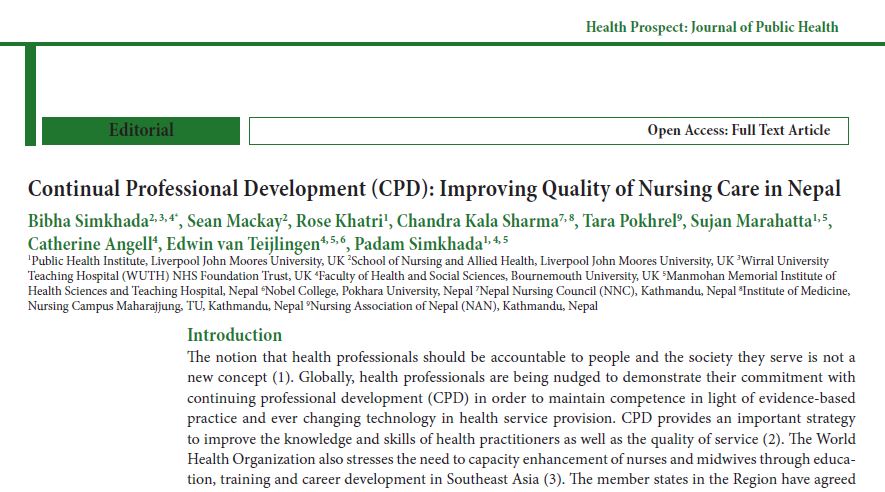 In the final week of 2016 the journal Health Prospect published our editorial on the importance of introducing nursing CPD in Nepal [1]. This editorial is based on a collaborative study between BU, Liverpool John Moores University (LJUM), Manmohan Memorial Institute of Health Sciences (MMIHS) in Nepal, Nepal Nursing Council (NNC), and the Nursing Association of Nepal (NAN). The BU part of the study is led by Dr. Catherine Angell based in the Centre for Midwifery, Maternal & Perinatal Health (CMMPH) and funded by a small grant from BU’s Centre for the Excellence in Learning. Two of our co-authors from LJMU Dr. Bibha Simkhada and Prof. Padam Simkhada are also Visiting Faculty at BU. The project is a true FUSION project as the Research, will inform Education (in the form of CPD) which will in turn improve Practice (of the many thousands of nurses in Nepal).
In the final week of 2016 the journal Health Prospect published our editorial on the importance of introducing nursing CPD in Nepal [1]. This editorial is based on a collaborative study between BU, Liverpool John Moores University (LJUM), Manmohan Memorial Institute of Health Sciences (MMIHS) in Nepal, Nepal Nursing Council (NNC), and the Nursing Association of Nepal (NAN). The BU part of the study is led by Dr. Catherine Angell based in the Centre for Midwifery, Maternal & Perinatal Health (CMMPH) and funded by a small grant from BU’s Centre for the Excellence in Learning. Two of our co-authors from LJMU Dr. Bibha Simkhada and Prof. Padam Simkhada are also Visiting Faculty at BU. The project is a true FUSION project as the Research, will inform Education (in the form of CPD) which will in turn improve Practice (of the many thousands of nurses in Nepal).
 Health Prospect is an Open Access journal and therefore freely available for any one to read online.
Health Prospect is an Open Access journal and therefore freely available for any one to read online.
Prof. Edwin van Teijlingen
CMMPH
Reference:
- Simkhada, B., Mackay, S., Khatri, R., Sharma, C.K., Pokhrel, T., Marahatta, S., Angell, C., van Teijlingen, E., Simkhada, P. (2016) Continual Professional Development (CPD): Improving Quality of Nursing Care in Nepal, Health Prospect 15 (3):1-3 http://www.nepjol.info/index.php/HPROSPECT/article/view/16326/13255
BU: At the vanguard of integrating TEF and REF

BU’s recent promotion of Dr Debbie Holley to Professor, acknowledges the important and unique integration of her work, which inspires excellence in Higher Education pedagogy, underpinned by her own research.
Professor Holley – who is focussing on both BU’s Teaching Excellence Framework (TEF) submission and co-convening unit of assessment 25 (Education) in the upcoming Research Excellence Framework (REF) – is a leader in pedagogy, learning, innovation and creativity.
Well known across the sector, Professor Holley holds both a prestigious National Teaching Fellowship and a Principal Fellowship from the Higher Education Academy (HEA). From an industry background initially, Professor Holley now specialises in pedagogic research and enhancing the student experience through learning excellence.
Professor Holley said: “BU is unusual in the sector in drawing together preparation for both REF and TEF, mirroring their Fusion agenda of excellence in research, education and professional practice. It is exciting to be at the centre of these policy opportunities, to build synergy in a way that will further enhance the student experience. At BU we pride ourselves on delivering innovative teaching and learning that works for all of our students, regardless of background.”
In recognition of its sector-leading approach to blending pedagogy and research, BU established the Centre for Excellence in Learning (CEL) in 2013 and – as Deputy Director – has placed Professor Holley in an important position to share and inspire others through her example.
CEL creates a focal point where high quality pedagogic practice can be generated, piloted, evaluated and shared, raising the profile of education as a valid source of scholarship. Its key aim is to harness energy and provide leadership that inspires excellence in learning, whilst conducting pedagogic research.
The Centre has proved to be very timely with the advent of the TEF, investing considerable energy over the last three years moving towards the majority of our academic staff becoming Fellows of the HEA or having a teaching qualification. CEL offers extensive staff development opportunities, inspiring colleagues to innovate in their teaching practice and to use BU’s new, state of the art building – The Fusion Building – to best advantage.
More information about BU’s pedagogic research, innovations and staff development opportunities can be found on the CEL website.
Successful HEA Reaccreditation
The Higher Education Academy (HEA) has reaccredited TeachBU and the PG Certificate in Education Practice until 2020 as routes to gaining national recognition as HEA Fellows. HEA Fellowship is an international recognition of a commitment to professionalism in teaching and learning in higher education and demonstrates that education practice is aligned with the UK Professional Standards Framework (UKPSF). To date over 75,000 individuals have become Fellows of the HEA.
The Accreditation Panel commended Bournemouth University on its commitment to the professional development and recognition of all staff that teach and support learning and the Academic Career Matrix, which further embeds the UK Professional Standards Framework within HR policies and processes.
They commented that the Centre for Excellence in Learning (CEL) is a driver of significant change and improvement across the institution and promotes research-engaged teaching which is aligned with the UKPSF. They also felt that there is an impressive infrastructure in place to support and develop the TeachBU provision and that participants are well supported by the clear guidance provided in the handbook which explains the requirements of each descriptor very well. Processes are well defined and the templates provided support applicants to structure their application to present the evidence of practice required.
We now have over 60% of BU academic staff with either HEA Fellowship and/or a recognized teaching qualification, with the ambition of raising this to 100% by 2018. Further details about TeachBU are available online here (via the ‘Working at BU’ tag on the staff intranet), together with details about upcoming introductory sessions and submission deadlines.
Dr Sue Eccles
November 2016
NVivo workshop and surgery – 4 November
As part of the Graduate School’s Research Development Programme 2016/17, Jacqueline Priego from CEL will be delivering an NVivo workshop. Details below:
Date: 4 November 2016
Time: 9.00-11.00
Venue: S103
Bookings via myBU *
Audience: This workshop is suitable for PGRs with some knowledge of qualitative analysis approaches.
Intended learning outcomes. By the end of this workshop you should be able to:
• Confidently identify the main elements of the NVivo interface
• Open and create new NVivo projects
• Prepare and modify documents
• Create codes and code documents
• Rearrange the coding system
• Perform simple retrieval of coded documents
• Use annotation and linking tools.
If you are already using NVivo for your research, you might like to drop in for the last half an hour of the session, when an open surgery will be held.
Jacqueline Priego has been delivering CAQDAS workshops and training postgraduate students and researchers on qualitative analysis since 2010. She is also available for queries relating to MAXQDA (not supported at BU).
*Spaces are limited due to room capacity – please book through myBU to avoid disappointment.











 REF Code of Practice consultation is open!
REF Code of Practice consultation is open! BU Leads AI-Driven Work Package in EU Horizon SUSHEAS Project
BU Leads AI-Driven Work Package in EU Horizon SUSHEAS Project Evidence Synthesis Centre open at Kathmandu University
Evidence Synthesis Centre open at Kathmandu University Expand Your Impact: Collaboration and Networking Workshops for Researchers
Expand Your Impact: Collaboration and Networking Workshops for Researchers ECR Funding Open Call: Research Culture & Community Grant – Apply now
ECR Funding Open Call: Research Culture & Community Grant – Apply now ECR Funding Open Call: Research Culture & Community Grant – Application Deadline Friday 12 December
ECR Funding Open Call: Research Culture & Community Grant – Application Deadline Friday 12 December MSCA Postdoctoral Fellowships 2025 Call
MSCA Postdoctoral Fellowships 2025 Call ERC Advanced Grant 2025 Webinar
ERC Advanced Grant 2025 Webinar Update on UKRO services
Update on UKRO services European research project exploring use of ‘virtual twins’ to better manage metabolic associated fatty liver disease
European research project exploring use of ‘virtual twins’ to better manage metabolic associated fatty liver disease